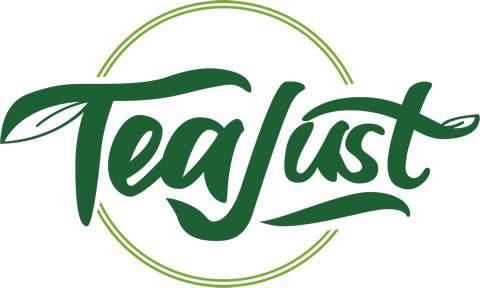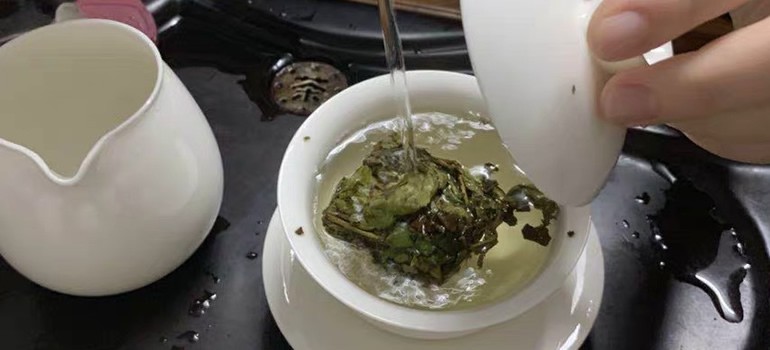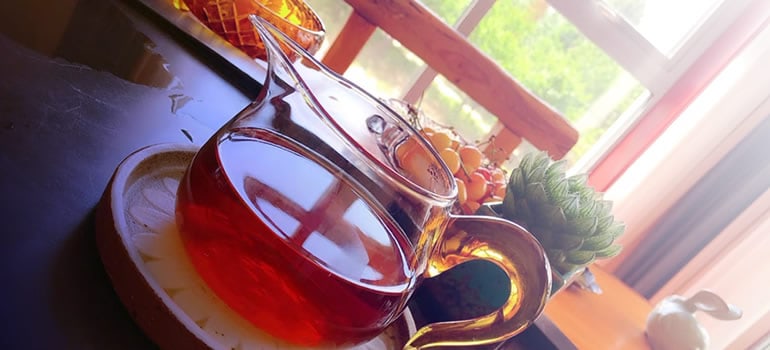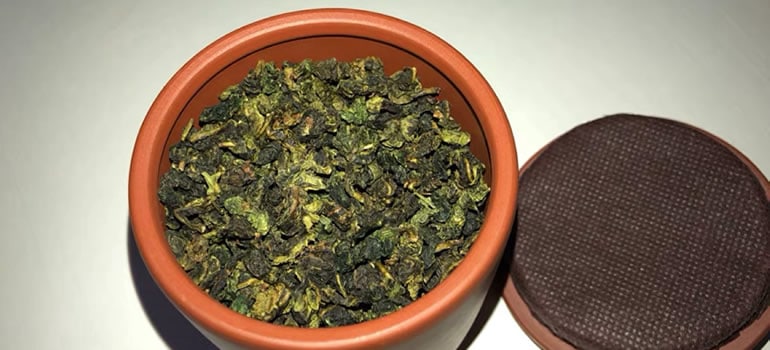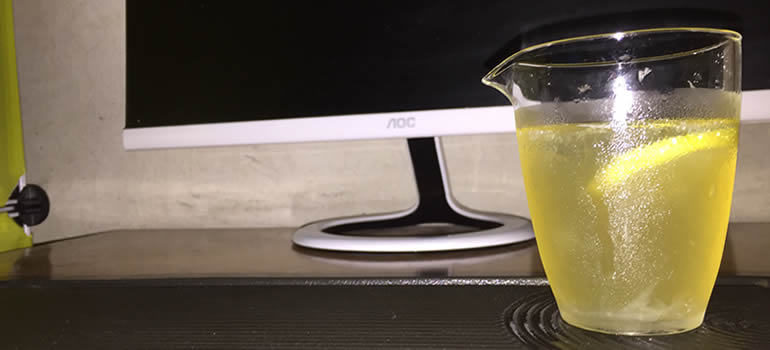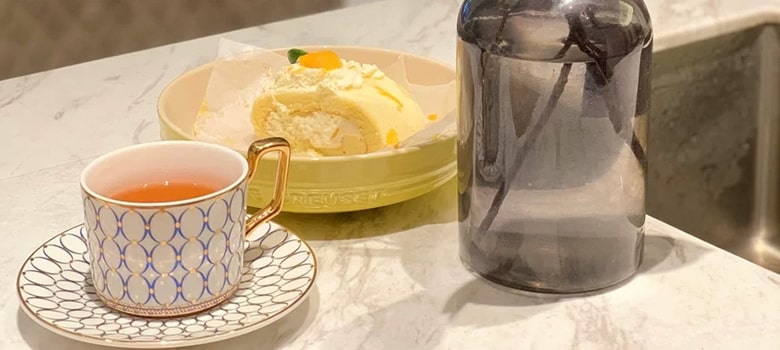
If you are here and reading this article, maybe it is this time of the year.
I am talking about the exam season, of course, and you are probably looking for something that may be able to give you a little boost.
So how good is tea in that regard, and can it actually help you in surviving your next test? Well, there is hope! Drinking the right kind of tea at the right time may give you just enough of a boost to get on top of it.
Tea may seem like a boring life-hack, but it can be a very decent one, nonetheless.
Stick around as we go through the best teas to drink before a test, and explore some exciting ideas and facts about them.
The Best Teas to Drink Before a Test
Here are the best teas to drink before a test for the ultimate cognitive abilities and overall performance boost.
1. Green Tea
Green tea is one of the best all-around types of tea you can drink. And although green tea consumption has been associated with a number of health benefits, it may also help you during your studies.
There are two essential ingredients found in green tea that can do that for you (1) the caffeine and (2) the L-theanine.
Caffeine is a rather tricky subject, and I will be talking about it more in this article.
For now, it is important to know that you don’t want to have too much caffeine before a test. And green tea has just enough caffeine to give you a nice little boost while at the same time keep your caffeine consumption low.
L-theanine, on the other hand, is a type of amino acid which tea leaves contain.
L-theanine has a lot of different effects on our body, some of which are:
- It increases the levels of serotonin and dopamine, which regulate mood, concentration, alertness, energy levels, cognitive abilities, and sleep. All of these may affect our test results;
- It stimulates the chemicals that reduce our stress and anxiety levels, which is definitely something everyone goes through before an important test; and
- It stimulates the alpha brain waves, which further improve relaxation, focus, and creativity. All three of which are going to be beneficial to any student.
One can argue that the many benefits of green tea consumption are because of the L-theanine. It can provide us with a very stimulating boost, combined with a decrease in the perceived stress and anxiety.
Its effect on the alpha brain waves is significant and should not be overlooked as these waves are connected with the state of the brain during meditation and creative work.
Of course, you don’t necessarily need to drink it right before the test. Regular tea consumption is super healthy and may give you a little edge during the exam season.
2. Matcha Tea
Both Green tea and Matcha tea are made from the leaves of the Camellia sinensis plant. However, they are not the only type of tea prepared from this plant.
Other teas like black tea, white tea, yellow tea, Pu’er tea, Oolong tea all come from the same plant. What makes them different is the processing methods used in their preparation.
However, not all of these are perfect for drinking before a test. For example, black tea may be too strong for some people as it contains high amounts of caffeine.
Matcha tea, on the other hand, goes through a very different preparation at the end of which the tea leaves are ground into a fine powder, which is known as Matcha.
Since you will be drinking the whole tea leaves, this makes Matcha tea a lot more potent and gives it more of a punch. Because of that, people usually drink small amounts of Matcha (generally between 2 to 4 oz).
The powerful combination of antioxidants, caffeine, and L-theanine make for an excellent tea that will increase your alertness, energy levels, and at the same time, make you more relaxed.
3. Yerba Mate
Yerba Mate (also known as just Mate) is a specific kind of tea made from the leaves of Ilex paraguariensis, which is a flowering tree native to South America.
The indigenous people in South America have discovered the stimulating effects of the plant and have been using it for a long time.
It is one of the strongest teas you can drink, so you may want to be a little more careful with it. It has, on average, about 78 mg of caffeine in a standard cup of tea (compared to the average 85 mg of caffeine found in coffee).
You can easily consider Yerba Mate, a not-so-distant relative of the coffee.
However, Yerba Mate tea contains more than just caffeine.
Enter theobromine. Theobromine is a substance found in cocoa, dark chocolate, and in the Yerba Mate tea.
It is a known stimulant, and it is considered a form of nootropic. And this is what made Mate a go-to tea for many Argentinian students.
It is one of the better ways to substitute coffee for something a lot healthier, and that doesn’t have the adverse effects of coffee consumption.
Although we definitely need more research done in this area, data is showing potentially beneficial effects of theobromine on the cognitive functions.
4. Ginseng Tea
Ginseng has been consumed for hundreds of years for its beneficial effects on the body.
There are two kinds of ginseng, American ginseng and Korean (or Asian) ginseng, with the latter being stronger and more potent.
However, what interests us here is its potential effect on the brain functions.
There are a number of studies suggesting different potential cognitive benefits of consuming ginseng. It may:
- Improve memory and mood levels;
- Provide brain protection against the damage done by the free radicals in the body;
- Enhance math skills; and
- Lead to less anxiety and stress.
Despite the number of studies showing potential cognitive benefits, experts believe more research needs to be done.
Interestingly enough, one study showed that ginseng supplementation led to better cognitive function in the short term, but not in the long run.
What this may mean is that the cognitive boosting effects of ginseng may wear off with time.
5. Sage Tea
Sage may be one of the best kinds of tea that you can drink before a test.
It has been used for centuries for its memory-boosting capabilities. And even research is starting to find proves for its once rumored capabilities.
One research done with 44 young adults that took either a placebo or a sage oil capsule concluded that the people who took sage were performing better on memory recall tests.
Sage tea thus may prove to be irreplaceable when it comes to studying before an exam and memorizing essential details while taking a test.
6. Chamomile Tea
Chamomile tea can actually help you in more than one way during the exam season.
For starters, chamomile tea is one of the best drinks you can have before bedtime. It has been shown to lead to better sleep and reduce stress and anxiety.
The high amounts of stress during the exam season can ruin the quality and quantity of your sleep, and a warm and cozy cup of chamomile tea before bedtime may end up being one of the best ways to boost your performance and test scores.
Having a healthier sleep is going to improve your memory. This is why a lot of people will tell you to prioritize sleep over a late-night study.
However, chamomile tea may not necessarily cure conditions like insomnia.
Even a cup before the test itself may be able to calm your nerves a bit if you feel extra stressed before an important test.
7. Ginkgo Biloba Tea
Ginkgo Biloba is the more popular name of the Maidenhair tree. The leaves of this tree are used for its memory boosting and cognitive improving capabilities.
The Ginkgo Biloba is so popular that it may very well be one of the top-selling herbal supplements.
Some studies support the claim that Ginkgo Biloba may improve one’s brain and cognitive functions. However, the results are very inconsistent, and other studies did not show any cognitive improvements in healthy adults.
During the exam season, the majority of students may feel anxious, stressed out, and even depressed due to the pressure. Consuming Ginkgo Biloba tea may help with that, as suggested by some studies.
And let’s not forget that many students may experience headaches and migraines as well, and this is something that Ginkgo Biloba may be able to treat effectively, too.
8. Rosemary tea
Rosemary can be used for the preparation of an excellent herbal tea that is rich in antioxidants and other anti-inflammatory compounds. Antioxidants are compounds that fight the adverse effects associated with the free radicals in the body.
One study showed potential benefits in improving long term memory and concentration.
And even just the aroma of rosemary may be able to boost one’s concentration and overall cognitive abilities.
So while you are studying at home, it may be worth giving both rosemary essential oils and tea a try.
Additionally, rosemary tea can be used to reduce the severity of depression and anxiety, both of which may occur during the exam season and before tests.
9. Peppermint Tea
Although mint tea doesn’t contain any caffeine, it may still end up being one of the best teas to drink before a test.
Here’s why.
Mint tea is associated with a host of different health benefits, the combination of which may be beneficial to everybody and not just students.
During the exam season, it is not a rare occurrence, due to the high pressure and constant work, to experience tension headaches.
Although there is not a lot of evidence on the subject, peppermint tea may be able to relax the muscles and reduce the headache pain.
Another benefit of peppermint tea is that it may be able to combat daytime fatigue. Something that can definitely hurt our performance while studying or taking a test.
One study discovered that young adults experienced less fatigue while performing a cognitive test after taking a peppermint oil capsule.
What Teas to Avoid Drinking Before a Test?
1. Teas Containing Too Much Caffeine
Although, as we have explored earlier in this article, caffeine is a terrific stimulant that can improve both your concentration and memory during a test, it can also have some adverse effects.
Too much caffeine has shown to lead to jitteriness, anxiety, and even potential headaches. And none of which you want to experience during a test.
What is recommended is to follow the DRIs for coffee consumption in order to avoid consuming too much caffeine.
I used to drink a lot of coffee, and what I discovered with time was that right after drinking coffee, I would feel very energetic. However, when it came down to learning and doing creative thinking and work, I felt like I lacked clarity and focus.
So I decided to do a little research on the topic. And wouldn’t you know it. I found something exciting.
I was reading a review of the studies and literature on the topic of whether or not caffeine is a good cognitive enhancer.
And here’s what I found.
Caffeine may improve or hinder memory and learning capabilities. It doesn’t necessarily, 100% of the tie, help with learning and remembering things.
Researchers found that caffeine proved beneficial in tasks in which the information and data are presented passively. Unfortunately, in tasks where people try to learn something intentionally, caffeine showed no improvements.
But there is more to it.
Caffeine showed improvements in tasks that relied just a little on working memory, but with tasks that rely heavily on working memory, the effects were, in fact, negative. So drinking a big mug of coffee during your studying or doing an exam my actually hinder your performance.
So all of the above kind of confirm my personal experience with caffeine. Additionally, what I found was that, especially with drinking tea in the afternoon, after the effect of caffeine has passed, I would get extremely tired and sleepy. I shudder at the thought of this happening during an exam.
A little silver lining here is that caffeine actually can improve memory performance when we are very tired or having a difficult time concentrating after a long day.
In other words, if you are not on the top of your performance and abilities for some reason, caffeine can indeed be useful.
And lastly, consuming tiny amounts of caffeine can reduce anxiety. And this is why teas with lower amounts of caffeine are preferred.
2. Teas with Sugar
Sugary foods and drinks can be a welcome respite for anyone who is feeling extra stressed during the exam season and especially before a test. After all, this is why sugary food is considered a comfort food as well.
But, you may want to skip the sugary foods and drinks whatsoever. And here’s why.
Sugar can be a quick fix if you feel a bit low on energy and power. However, sugar has been shown to inhibit certain brain-derived neurotrophic factors. In other words, sugar consumption can hinder your ability to learn, concentrate, and memorize.
This, of course, doesn’t just apply to sugary sodas and juices. Keep in mind that even fruit juices and energy drinks can contain high amounts of sugar. And if you like drinking your tea extra sweetened, this may also add too much sugar to your diet.
Is Drinking Tea Before a Test Worth It?
There is no doubt about it – tea is a great alternative, and let’s not forget – a healthy alternative to all the other beverages people drink.
One of the most important things you need to have covered before an important test is staying adequately hydrated.
Even extremely low amounts of dehydration can affect your memory and cognitive functions negatively during a test.
And tea is an easy and healthy fix not just to stay hydrated but give yourself an ever so slight boost and provide your body with beneficial antioxidants at the same time.
Should You Drink Tea During the Test?
Let’s not forget that you can drink tea not just before but also during your test.
In fact, that may be something worth your while, as researchers have discovered that students who took a drink to their exams had, on average, 10 percent better results (the type of drink did not matter).
This may lead to interesting conclusions that just the mere act of you taking a sip during the test may help in calming your nerves and collecting your thoughts.
And another study from the University of East London discovered that children – aged 7 to 9 – who drank water had on average better test results when it comes to visual attention and memory.
So even if you don’t have tea handy, I would encourage you to bring at least a bottle of water on your next exam.
